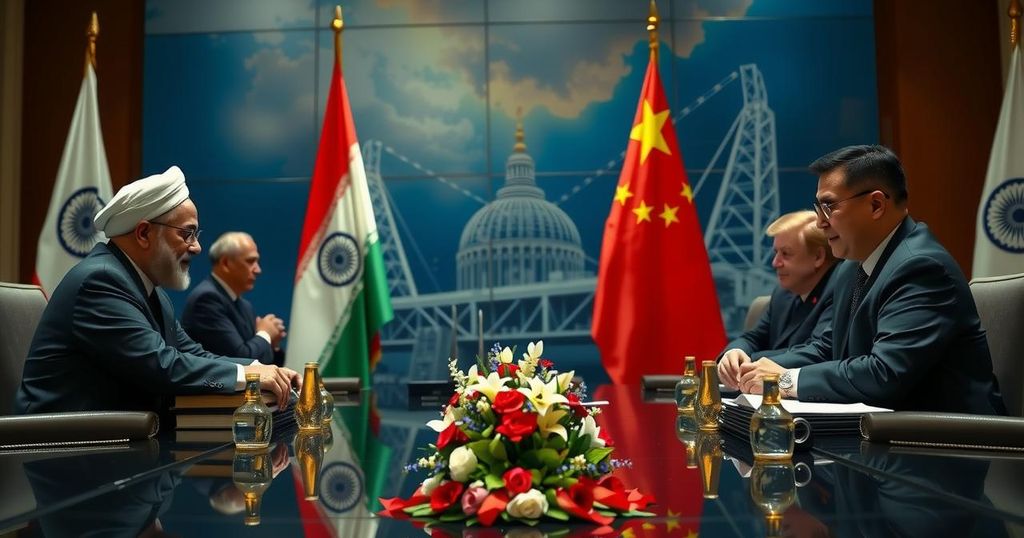President Vladimir Putin convened the BRICS Summit in Kazan, which included representatives from over twenty nations aiming to devise a “new world order” to challenge Western influence. Key discussions involved reducing reliance on the U.S. dollar and fostering improved relations between China and India. Despite Russia’s anti-Western stance, other members seek to reform global institutions to reflect the concerns of the Global South. The summit highlighted the need for an alternative to SWIFT and further collaborations, even as members expressed differing perspectives on the future trajectory of BRICS.
This week, President Vladimir Putin of Russia hosted the latest BRICS Summit in Kazan, gathering representatives from over two dozen countries to deliberate on establishing a “new world order” that seeks to diminish Western influence, particularly that of the United States and the dollar-dominated global economy. Running from Tuesday to Thursday, this summit serves as a significant platform for President Putin following Russia’s invasion of Ukraine in 2022, aiming to foster an environment less reliant on the U.S. dollar to counteract sanctions imposed by Western powers. During the summit, President Putin asserted, “The dollar is being used as a weapon. We really see that this is so. I think that this is a big mistake by those who do this.” In a notable development, Chinese President Xi Jinping and Indian Prime Minister Narendra Modi leveraged this gathering to signal an intent for improved relations amid their historical tensions, coinciding with a recent resolution of military confrontations over disputed Himalayan territories. The BRICS bloc—an acronym for Brazil, Russia, India, China, and South Africa—originated as an economic descriptor of emerging markets and has expanded significantly to include countries like Iran, Egypt, Ethiopia, the United Arab Emirates, and Saudi Arabia. Furthermore, Turkey, Azerbaijan, and Malaysia have expressed interest in joining, with Turkey being the first NATO member to consider alignment with BRICS. Representing approximately half of the global population and 35% of the world’s output, the alliance is positioning itself as a counterweight to Western dominance in global affairs. Despite the evident anti-Western sentiment from Russia, other member nations such as Brazil, India, and South Africa emphasize a more constructive approach, focusing on reforming international institutions to better reflect the needs of the Global South. There is an ongoing dialogue concerning the establishment of an alternative payment system to SWIFT, although concrete plans to supplant the dollar remain ambiguous. Iranian President Masoud Pezeshkian articulated that BRICS should transcend being merely a “dialogue club,” criticizing the impact of Western sanctions and the monopolistic outlook of Western nations on global peace and stability. He noted, “This monopolistic outlook has resulted in increased violence, war, and terrorism on the one hand, and unprecedented use of economic and political sanctions on the other.” The discussion at the summit underscores the evolving geopolitical dynamics as countries grapple with the potential decline of dollar supremacy, especially after former President Donald Trump warned that losing the dollar’s status could lead to significant economic repercussions for the United States.
The BRICS Summit serves as a critical venue for discussing the alignment of emerging economies and their collective stance against Western hegemony. The bloc originated from a convergence of economic interests among Russia, China, India, and Brazil, later expanding to include South Africa, and is now seeking to broaden its membership to influence global economic policies. This summit is particularly significant in the post-Ukraine invasion context, as Russia looks to solidify alliances that can provide economic alternatives to Western sanctions and practices.
In conclusion, the BRICS Summit represents a strategic effort by its member nations to establish a counter-narrative to Western dominance in global economic systems. President Putin’s statements and the collaborative spirit exhibited by leaders like Xi Jinping and Modi signify a pivotal shift towards a more multipolar world. However, the lack of a concrete framework for an alternative to the dollar, coupled with diverse motivations among member states, suggests that the full realization of BRICS’ potential is yet to be seen.
Original Source: www.foxnews.com






